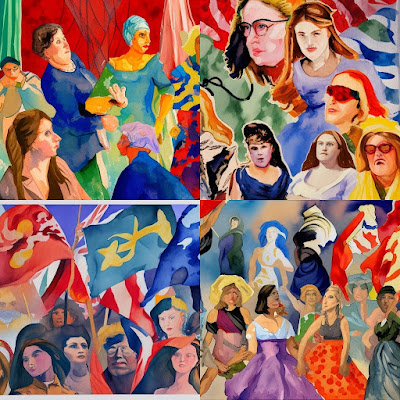Blaming the victim(s)? Is it the aid industry’s fault when places are labeled ‘holes’?
I was in the process of writing a short response to NPR’s Goats & Soda invitation to comment on How Are Poor Countries Portrayed By Aid Groups And The Media? when I realized that this questions deserves a separate blog post.
This is primarily because I disagree with the two tweets that started the discussion (and, yes, I am fully aware that they are ‘just’ tweets and were not indented as fully developed op-eds, research papers etc.).
So I blame Malaka Gharib for this post ;)
In general most organizations I am coming across in my work are communicating quite nuanced, more nuanced than in the past, and viral campaigns may receive some attention-but almost always nuanced, critical responses, for example the recent Oxfam GB tax evasion campaign video.
Since my research also covers aid worker biographies and writings about their life-worlds I am also pretty sure that very few push a single, negative stories about the places they work that contain the word ‘hole’; maybe the (in)famous complaints about the airport in Juba, South Sudan, are an exception ;)!
Dina Pomeranz highlights another aspect that I also do not agree with entirely:
Unfortunately, for many people in Haiti, the Central African Republic, Congo, Louisiana, Syria, Afghanistan or at the many emerging front lines of climate change this story feels differently. And for the aid industry to gather, let alone maintain, support in many long-term, protracted crises is very difficult. You do not have to go down the ‘heart of darkness’ narrative path, but it warrants a longer discussion as to when words like ‘hell’ or ‘hole’ convey a legitimate message of rather unpleasant places.
Dave Algoso sums it up quite nicely:
Just to be sure: As imperfect as the offerings of the aid industry are, blaming them for a changing political climate where ‘holes’ become a topic for discussion seems unfair. Public and political perceptions are often rooted in long-term myths and short-term political discussion around ‘fixing’ a problem, a country or a complex issue like migration. At the same time the aid industry has become more self-reflective and self-critical and nuanced campaigns and advocacy by far outnumber alarmist stories or the denigration of people and places as a fundraising strategy.
This is primarily because I disagree with the two tweets that started the discussion (and, yes, I am fully aware that they are ‘just’ tweets and were not indented as fully developed op-eds, research papers etc.).
So I blame Malaka Gharib for this post ;)
Owen Barder started the discussion:Sheesh! it's been a busy week for #globaldev Twitter. We're asking @NPR's audience to share their thoughts on points made by @owenbarder @DinaPomeranz: Does the way that we talk about poor countries feed into the idea that they’re “hellholes” or worse? https://t.co/H8kBdsGm41— Malaka Gharib (@MalakaGharib) January 12, 2018
I am doing Communication for Development for a living and I really have a hard time to follow Owen’s logic here. Policy-making on terrorism, migration and development does not seem to be informed by (mis-)representations of countries or crises by NGOs and other aid agencies. In most cases it is exactly those organizations that speak out when policies change or complex development issues are turned into simplified questions of securitization. There may be aid organizations that are not as strict as MSF in refusing EU money in disagreement with migration policies, but in most cases I would consider them more the ‘victims’ of policy changes than the ‘instigators’.Aid workers, NGOs and aid agencies: if you paint developing countries as potential sources of terrorism, disease and unwanted migration to justify your budgets, don’t be surprised if politicians join you in denigrating those countries.— Owen Barder (@owenbarder) January 12, 2018
In general most organizations I am coming across in my work are communicating quite nuanced, more nuanced than in the past, and viral campaigns may receive some attention-but almost always nuanced, critical responses, for example the recent Oxfam GB tax evasion campaign video.
Since my research also covers aid worker biographies and writings about their life-worlds I am also pretty sure that very few push a single, negative stories about the places they work that contain the word ‘hole’; maybe the (in)famous complaints about the airport in Juba, South Sudan, are an exception ;)!
Dina Pomeranz highlights another aspect that I also do not agree with entirely:
As I mentioned in a recent post, The complexities of the ‘lifting people out of poverty’ narrative, sharing aggregated, macro data on how ‘the world’ is becoming a better place is a powerful and useful reminder about the power of data and a great way to counter overly generalized ‘the world is getting worse because of (crisis)’ narratives.Unpopular opinion:— Dina D. Pomeranz (@DinaPomeranz) January 12, 2018
When wellmeaning people describe poverty as a hellhole, we shouldn't be surprised that people end up thinking of poor places as "shitholes".
When I share positive news about low income countries, I regularly get criticised for "undermining impetus for action."
Unfortunately, for many people in Haiti, the Central African Republic, Congo, Louisiana, Syria, Afghanistan or at the many emerging front lines of climate change this story feels differently. And for the aid industry to gather, let alone maintain, support in many long-term, protracted crises is very difficult. You do not have to go down the ‘heart of darkness’ narrative path, but it warrants a longer discussion as to when words like ‘hell’ or ‘hole’ convey a legitimate message of rather unpleasant places.
Dave Algoso sums it up quite nicely:
The difficult for all of us is to find a balance between describing a place with harsh words and still maintain a non-linear story that accounts for some of the complexities: Place A is simply not a ‘hellhole’ because the people of A cannot manage themselves and their place, but because there is most likely a complex web of issues usually involving ‘us’ (e.g. colonialism) and ‘them’ (e.g. an undemocratic regime) and many shades of grey in between. When I collected stories after Hurricane Maria, it was scary to see how quickly ‘development’ narratives unfolded that involved issues of power, (post-)colonial governance and problems far beyond the capabilities of small island states to solve.The problem isn't about being positive v negative. It's simplistic v complex.— Dave Algoso (@dalgoso) January 12, 2018
Just to be sure: As imperfect as the offerings of the aid industry are, blaming them for a changing political climate where ‘holes’ become a topic for discussion seems unfair. Public and political perceptions are often rooted in long-term myths and short-term political discussion around ‘fixing’ a problem, a country or a complex issue like migration. At the same time the aid industry has become more self-reflective and self-critical and nuanced campaigns and advocacy by far outnumber alarmist stories or the denigration of people and places as a fundraising strategy.




Comments
Post a Comment